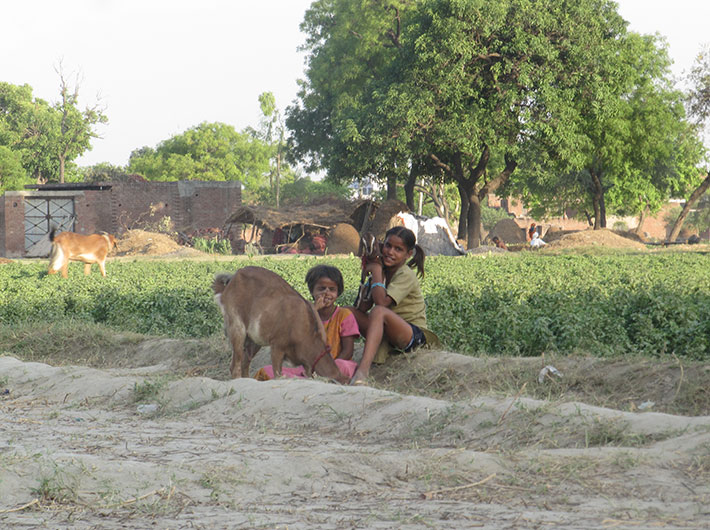Violence and caste crimes are tacitly supported by the police in Uttar Pradesh. A ground report from Badaun, the district that has of late taken the state to a new level of notoriety
Badaun, a nondescript district of Uttar Pradesh, is neither a subversive nation like North Korea nor a militant-haven like Somalia to merit the attention of the international community. Yet it has, and UN secretary general Ban Ki-moon has expressed his concern over the gang-rape and killing of two cousins at Katra Saadatganj village of the district.
The crime appeared to be a direct fallout of the prevailing political culture in Uttar Pradesh where the ruling party chief and former chief minister, Mulayam Singh Yadav, recently sought to downplay its magnitude by saying, “Boys are after all boys. They make mistakes”.
The crime was just the symptom of a syndrome that has afflicted the state during the past two years of the Samajwadi Party regime led by young chief minister Akhilesh Yadav. A visit to the village unravels the complex social and political realities and their connection with the underworld.
* * *
At thirty minutes past four on June 5, it is stifling hot in Katra Sadatganj in Uttar Pradesh’s Badaun district. But the heat wave has not deterred two young girls from venturing out to the outskirts of the village, playing with a goat in a vast swathe of fields with ready-to-harvest mentha (mint).
They seem to take no note of a mango tree, merely a stone’s throw away, from which the bodies of two minor cousins were found hanging a few days earlier.
They seem to take no note of a locked house, some 150 metres away, that belongs to Pappu Yadav, who, along with his two brothers, is accused of having raped and killed the two cousins.
They are still young, and innocent of the horrors lurking in their quiet neighbourhood, but soon they will be told to be careful, not to go out alone in the evening – things the two victims, aged 12 and 14, must have been told too.
That is why, when one of them wanted to go to the fields after dark to relieve (her home has no toilet), she asked the other to accompany her – like every day, and her mother anxiously asked her to come back soon.
But they did not return soon. So their family members started searching for them, and soon their worst fears were confirmed.
“I saw Pappu taking away the two girls near the fields. There were others who helped him but I could not identify them in the dark. I raised alarm and all of us went to look out for them with torches but failed to trace them. When we approached the officers at the village police chowki and told them about Pappu – his house is just a few metres away – constable Sarvesh Yadav only mocked us and asked to us go back home. He said the girls would return,” says Babu Ram, 25, a relative of the victims and the only witness in the case.
The bodies of the cousins were found the next day, hanging from the mango tree near the fields they had gone to the previous evening. The father of the elder cousin says, “Sarvesh (the constable) had in fact casually told us to go and see if (the bodies of) the girls were not hanging from a mango tree.”
The policemen ignored requests from the family and refused to register even a formal complaint – which is against the law. It also goes against the recommendation of the JS Verma panel that said for crimes against women, immediate registration of complaint should be mandatory, failing which the erring officers must be strictly penalised.
But what happened should not be surprising since many villagers say police constable Sarvesh Yadav was close to Pappu Yadav. Sarvesh often visited Pappu’s house, where he ate and drank with him and others, locals say. This was not unusual, they point out, adding that some of the policemen posted at this chowki would often spend their duty hours leisurely at some or the other villager’s house. Needless to say, their local hosts received police patronage in return.
Add to that the basic caste equation: the victims belonged to an OBC (other backward class) community called the Shakya. There are about 3,000 Shakyas in this village of 6,000, though the Yadavs, numbering about 500, are dominant.
The anti-social elements among the Yadav community, along with local police patronage, have little to worry, especially in the Samajwadi Party regime. After Akhilesh Yadav became chief minister in May 2012, Yadav officers have come to dominate the state police force. Data shows about 60 percent of police stations in key districts are headed by officers of the Yadav caste. In Badaun itself, 16 of 22 police stations are headed by Yadavs.
Katra Sadatganj is one of the backward villages on Badaun’s border on the banks of the Ganga, across which is a large tract of vacant land full of wild vegetation. Locals call that area ‘Katri’. Of the nine police stations in Badaun district, the regions facing Katri, stretching about 110 kilometres along the Ganga, have six Yadav station heads.
Notorious badlands
The entire Katri region is controlled by the mafia in collusion with sections of police and patronised by the political class. Katri region, as late as a decade ago, was a safe haven for dreaded dacoits whose modus operandi was much like the infamous Chambal dacoits. They would cross the river, loot villagers and flee back to their safe havens across the river, and then to Farrukhabad district. From there, escaping to Mainpuri, and onward to Chambal, was easy.
Over time, dacoity gave way to mafiosi. The mafia gangs that rule the roost along the Ganga in Badaun are mostly led by Yadavs or Mallahs. Depending on who is in power in Lucknow, one dominates the other. At present, Yadav-led gangs have become active, according to reliable sources, including officials of the Badaun police.
Along the stretch of the Ganga touching the Badaun district border, mafia gang operators, mainly Yadavs, have taken control of illegal sand mining and the business of illicit liquor.
In fact, the police chowki at Katra Sadatganj was set up more than three decades ago to guard the village against the terror of dreaded outlaw Chhaviram, a Yadav by caste, who operated from across the river. When Chhaviram was shot dead by police in the ravines of Mainpuri in 1982, he had over 80 cases registered against him in various districts.
That, however, did not end dacoity here. In 2006, notorious bandit Kalua – a Yadav again – was killed by police in Badaun’s neighbouring district Bareilly. He carried a reward of '5 lakh on his head for killing over 15 personnel of provincial armed constabulary, a reserve force in UP, and looting arms and ammunition.
In and around Badaun, criminals have been found to be molesting and raping women and committing murders, senior district police officials point out.
It was from across the river, from Katri region, that Pappu Yadav’s family came to Katra Sadatganj two years ago and settled down, villagers say.
Of the criminal-police nexus on the caste axis, the two young cousins were not the first victims. When Uttar Pradesh director general of police (DGP) Anand Lal Banerjee visited the victim’s family at Katra Sadatganj on June 4, an unidentified woman turned up from neighbouring Shajahanpur district and told him that she and her family had left the village a year back after local goons from the Yadav community killed her seven-year-old son. She also said that when she approached the police chowki, she was threatened, after which she left the village.
The aftermath
After the tragedy, the village is under constant police patrolling but that has failed to instil confidence among the villagers as the five men arrested so far in this case include two police constables posted at the local chowki, Sarvesh Yadav and Chhatrapal Yadav (apart from Pappu and his brothers Awadhesh and Urvesh Yadav).
Even as two sections of the PAC with 12 personnel each, two sub-inspectors, two head constables and four men and women constables stand guard outside the victims’ house, the family members say they feel more secure thanks to the presence of media persons rather than that of
the police.
“We have been given security because of the media pressure. Otherwise, when we needed them to help us find our daughters they turned their faces away,” says the mother of one of the victims.
And this police team will move on when the media focus will move elsewhere. Meanwhile, the two younger girls playing near the tree will have to live with an uncertain future.

